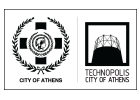
Nektarios Tavernarakis is the Chairman of the Board of Directors at the Foundation for Research and Technology-Hellas, Research Director at the Institute of Molecular Biology and Biotechnology, and Professor of Molecular Systems Biology at the Medical School of the University of Crete, in Heraklion, Greece.
He is the Director of the Graduate Program on BioInformatics at the Medical School of the University of Crete and is also heading the Neurogenetics and Ageing laboratory of IMBB. He is an elected corresponding member of the Academy of Athens, an elected member and Vice President of the Scientific Council of the European Research Council (ERC), and an elected member of the European Institute of Innovation and Technology (EIT) Governing Board and Executive Committee, the American Association for the Advancement of Science (AAAS), the European Molecular Biology Organization (EMBO), the German National Academy of Sciences (Leopoldina), the European Academy of Sciences and Arts, and Academia Europaea. He has also served as the Director of the Institute of Molecular Biology and Biotechnology.
He earned his Ph.D. degree at the University of Crete, and trained as a postdoctoral researcher at Rutgers University in New Jersey, USA. His research focuses on the molecular mechanisms of necrotic cell death and neurodegeneration, the interplay between cellular metabolism and aging, the mechanisms of sensory transduction and integration by the nervous system, and the development of novel genetic tools for biomedical research.
He has published numerous scientific papers in top-tier, cross-discipline, international scientific journals, in addition to invited book chapters, and other publications, including editorials, commentaries, and science-popularizing articles.
He has also received several notable scientific prizes, including two ERC Advanced Investigator Grants, and an innovation-supporting ERC Proof of Concept Grant. He is one of the first in Europe, and the first in Greece, to have been awarded this highly competitive and prestigious grant twice. He is also the recipient of the EMBO Young Investigator award, the Alexander von Humboldt Foundation, Friedrich Wilhelm Bessel research award, the Bodossaki Foundation Scientific Prize for Medicine and Biology, the Empeirikeion Foundation Academic Excellence Prize, the BioMedical Research Award of the Academy of Athens, the Galien Scientific Research Award and the Helmholtz International Fellow Award.
SCIENTIFIC ADVISORY BOARD





